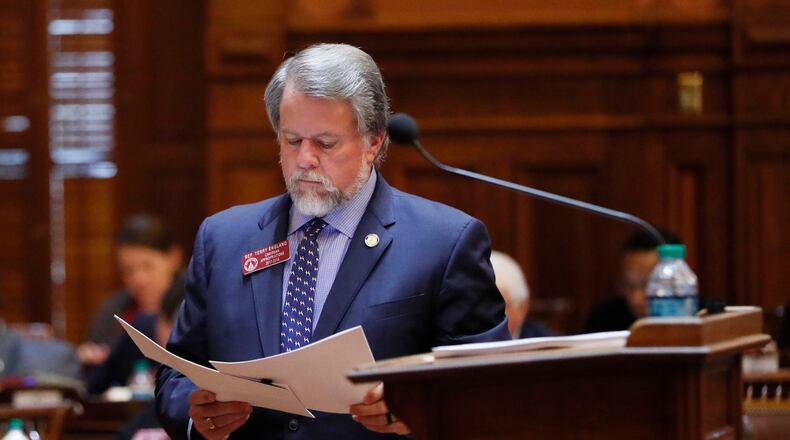Georgia House budget writers began voting Thursday on Gov. Brian Kemp’s proposals to cut state spending, deciding, among other things, to add money to fund more food safety inspectors and prevent agency furloughs.
The House is expected to approve a midyear spending plan next week. The proposal will then move on to the Georgia Senate.
But Thursday was the House’s opening shot at Kemp’s recommendations to cut $200 million this year and $300 million next year. Several more budget subcommittees will vote Tuesday, as will the House Appropriations Committee.
Through the state’s budget, taxpayers help educate 2 million children, provide health care to more than 2 million Georgians, build roads and bridges, manage parks, investigate crimes and incarcerate criminals, and regulate insurance firms and utilities, along with dozens of professions. The state issues driver’s licenses and helps pay for nursing home care for the elderly.
Kemp ordered state agencies in August to prepare plans for 4% budget cuts this fiscal year and 6% next year to both prepare in case of an economic slowdown and provide money for his priorities, including the $2,000 pay raise for teachers he recommended in January.
About three-fourths of the budget — money that goes to k-12 schools, colleges, the health program Medicaid and transportation — were exempted from reductions.
Under state law, the governor sets the estimate of how much tax money the government is expected to bring in next year. Lawmakers can’t spend more than that, so to make up for things they want to add, they must cut elsewhere.
Legislators have spent the past few weeks hearing from state agencies impacted by the cuts.
Privately, legislators have accused some agency directors — most of them appointed by Kemp — of soft-pedaling the impact of his proposal.
Lawmakers have expressed concerns about spending reductions in a lot of areas, including mental health and substance abuse programs, rural economic development, agricultural research and food inspections, and criminal justice and public defender programs.
A major part of Kemp's savings would come from eliminating about 1,200 vacant state positions, some of which — including crime lab scientists and guards in the juvenile justice system — lawmakers say need to be filled.
Agriculture Commissioner Gary Black, for instance, warned lawmakers that there would be fewer food and meat inspections if Kemp’s proposal to eliminate vacant positions was approved. Black said he’s had a hard time filling some of those positions because the pay is in the range of $31,000 a year.
But a House subcommittee voted Thursday to recommend adding funding for five food safety inspectors and two animal inspectors to Black’s budget.
Rep. Penny Houston, R-Nashville, the chairwoman of the budget subcommittee over agriculture, said the rapid growth of stores such as Dollar General in rural Georgia makes it imperative for the state to have more food inspectors.
She said the state needs to consider pay and other issues that are making it hard for agencies to hire and keep employees.
“We’ve got to look at that rather than pushing it down the road every year,” she said.
Other subcommittee chairmen have said this week that the General Assembly may consider higher pay for workers in high turnover agencies when they write the budget for fiscal 2021, which begins July 1.
The subcommittees Thursday also decided to recommend adding money so employees of the Public Service Commission, which regulates utilities, wouldn’t have to take furloughs, and putting funding back into the budget Kemp proposed to cut from state schools for blind and deaf students and the Georgia Commission on the Holocaust. Houston said her subcommittee was also recommending adding $200,000 to run the state’s new hemp growing program.
After approving the midyear budget, lawmakers will take up the spending plan for 2021, which includes the pay raises for teachers.
THE STORY SO FAR
Gov. Brian Kemp in August directed state agencies to cut their spending by 4% this fiscal year and 6% next year. The governor’s order exempted money that goes to k-12 schools, colleges, the health program Medicaid and transportation.
The state House and Senate followed up on Kemp’s order in September by conducting rare hearings before the legislative session began. They then followed routine by holding a round of hearings the second week of the session.
Then House Speaker David Ralston scrapped the previous schedule for the session so legislators could do more work this week on the budget.
About the Author
Keep Reading
The Latest
Featured





